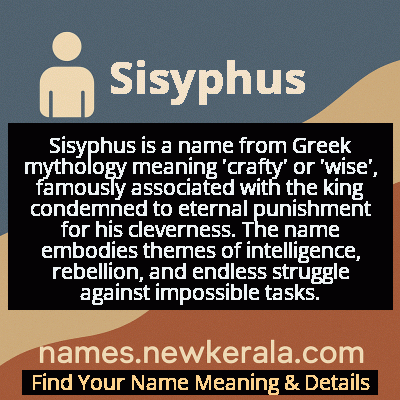Sisyphus Name Meaning & Details
Origin, Popularity, Numerology Analysis & Name Meaning of Sisyphus
Discover the origin, meaning, and cultural significance of the name SISYPHUS. Delve into its historical roots and explore the lasting impact it has had on communities and traditions.
Name
Sisyphus
Gender
Male
Origin
Greek
Lucky Number
1
Meaning of the Name - Sisyphus
Sisyphus is a name from Greek mythology meaning 'crafty' or 'wise', famously associated with the king condemned to eternal punishment for his cleverness. The name embodies themes of intelligence, rebellion, and endless struggle against impossible tasks.
Sisyphus - Complete Numerology Analysis
Your Numerology Number
Based on Pythagorean Numerology System
Ruling Planet
Sun
Positive Nature
Leaders, ambitious, highly driven, self-reliant, innovative.
Negative Traits
Overly aggressive, domineering, impatient, selfish.
Lucky Colours
Red, orange, gold.
Lucky Days
Sunday.
Lucky Stones
Ruby, garnet.
Harmony Numbers
2, 3, 9.
Best Suited Professions
Entrepreneurs, managers, engineers.
What People Like About You
Courage, determination, leadership.
Famous People Named Sisyphus
Sisyphus of Corinth
Mythological King
Founder and first king of Ephyra (Corinth), known for his cunning and trickery against gods
Sisyphus (Literary Character)
Philosophical Symbol
Central figure in Albert Camus' essay 'The Myth of Sisyphus', representing the absurd hero
Sisyphus Coldiron
Academic Scholar
Classics professor known for modern interpretations of Greek mythological figures
Name Variations & International Equivalents
Click on blue names to explore their detailed meanings. Gray names with will be available soon.
Cultural & Historical Significance
The story appears in Homer's Iliad and Odyssey, was elaborated by later Greek writers, and continues to inspire modern interpretations across literature, psychology, and popular culture. Sisyphus embodies the tension between human ingenuity and cosmic indifference, making him a timeless symbol of both human limitation and resilience. His myth has been adapted across millennia, serving as a powerful allegory for everything from political oppression to personal psychological patterns, ensuring his continued relevance in contemporary discourse about meaning, purpose, and human endurance.
Extended Personality Analysis
Individuals named Sisyphus are typically perceived as possessing exceptional intelligence, strategic thinking, and a rebellious spirit against established authority. They demonstrate remarkable persistence and determination in pursuing their goals, often showing an ability to devise clever solutions to complex problems. However, this cunning nature can manifest as manipulative tendencies or a willingness to bend rules to achieve desired outcomes. The name carries connotations of someone who challenges conventional wisdom and refuses to accept limitations, though this may lead to conflicts with authority figures or systems.
Their personality is marked by a paradoxical combination of brilliant problem-solving skills and a tendency to create self-defeating cycles through overconfidence or refusal to acknowledge boundaries. This creates a complex character profile of someone both admired for their intellect and cautioned against for their potential to overreach. The mythological association suggests a person who might excel in crisis situations through cleverness but could struggle with long-term planning or accepting necessary constraints, embodying the eternal struggle between human ambition and practical limitations.
Modern Usage & Popularity
In contemporary times, Sisyphus remains an extremely rare given name, primarily used in academic, literary, or philosophical contexts rather than for actual children. Its usage is almost exclusively symbolic or referential, appearing in philosophical discussions, artistic works, and as a metaphor in political and social commentary. The name sees occasional use in fiction for characters embodying themes of endless struggle or brilliant but doomed ambition. While not appearing on official baby name registries, it maintains cultural relevance through its metaphorical power. Modern parents who might consider this name typically do so for its deep philosophical resonance and classical heritage, though the overwhelming association with futile labor makes practical usage uncommon. The name enjoys more frequent employment in business and brand names where it ironically represents persistence against odds or appears in educational contexts exploring classical mythology and existential philosophy.
Symbolic & Spiritual Meanings
Sisyphus symbolizes the human condition of endless, repetitive labor and the struggle against seemingly insurmountable obstacles. Metaphorically, he represents the absurd hero who finds meaning in meaningless tasks, embracing his fate with consciousness and rebellion. The rolling stone embodies unfulfilled aspirations, the punishment for hubris, and the cyclical nature of human endeavors. In psychological terms, Sisyphus represents the patterns of self-defeating behavior and the human capacity to persist despite knowing the futility of one's actions. The myth has been interpreted as representing everything from the daily grind of modern life to the eternal recurrence of historical patterns. Most profoundly, Sisyphus symbolizes the triumph of the human spirit through conscious acceptance of one's circumstances, making him an emblem of existential freedom found within constraint and the dignity that comes from persevering in the face of inevitable failure.

